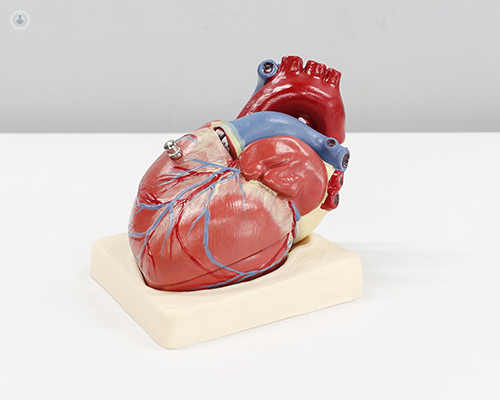Causes of innocent and dangerous heart murmurs
Escrito por:Heart murmurs can feel strange to those who do not know what they are. Most of the time they are harmless, but sometimes they are more serious. Experienced consultant cardiologist Dr Aigul Baltabaeva has given us a thorough explanation of the causes of both types of heart murmurs and advises when we should seek help.

What is a heart murmur?
The human heart has 4 chambers; two right-sided chambers pump blood into the lungs and the two left-sided chambers pump blood into the body. They have no direct connection to avoid mixing all oxygenated and deoxygenated blood. The two chambers are divided by a partition and the bottom of the partition is made up of muscle and the top partition is made up of fibrous material which doesn’t stretch too much, which is the same durable material making up two valves on each side. One between the upper and lower chambers, and one is a big exit of the main chambers. Both valves open and close in synchronised movements to ensure smooth, one-directional flow of the blood. They make the typical “lapped up” type of sound, which you could call “normal heart” sounds.
Heart murmurs are the additional, unusual sounds in between the normal sounds and are generally quite innocent. It’s not possible to be heard by patients themselves because it only sticks out when doctors listen to the chest with a special acoustic listening device that can pick up the heart-rhythm vibrations called a stethoscope.
What causes heart murmurs considered to be innocent?
They are caused by excessive strain on the heart muscle which then the blood can often make the extra sound. Examples of this include:
- exercise
- stress
- dehydration
- fever
- pregnancy
- deficient oxygen-carrying conditions such as anaemia
- overactive thyroid
Up to 40 to 45 per cent of children have got innocent heart murmurs which settle later in life, and 10 to 15 per cent of adults have got innocent murmurs. A very small proportion of them have a condition which could be serious.
What causes heart murmurs considered to be dangerous?
The majority of people who suffer from serious heart murmurs tend to actually be born with the condition, as opposed to others where it is a result of some complications developed by the heart.
There are various causes of more serious heart murmurs. Some of those are from a problem with the heart structure (i.e. a whole in the partition between the chambers). Sometimes the bottom of the partition starts growing inadequately, also known as hypertrophic cardiomyopathy, causing the lining of the pathway within the chambers and blood passing through the narrow pathway to become noisier.
The main bulk of noisier murmurs comes from the valves, coming down to two conditions: either they fail to open properly or they fail to close properly. Therefore, the blood makes a noise when passing through the filled-up valve or either from leaking back due to a valve that isn’t closed tightly. To simplify, the issue can be divided into the narrowing valve and the leaky valve.
Majority of the narrowing valve is due to ageing, where the valves become thick and rigid over time. They eventually open less and less and the opening of the valve becomes very small, as small as a pinhole. Typically, due to a very high-pressure environment, the aortic valve is the most frequently affected one. Unless there is a structural abnormality to the valve, this normally happens after the age of 70. Another cause may be damage to the valves from a staph infection during childhood, for example, usually the left side. If a tumour is growing in the upper chambers of the heart, it can become so large that it protrudes into the unaffected and healthy valve, causing it to narrow. All these main narrowing causes can be heard via the stethoscope.
The main problem comes from a leaking of the valve. This could happen when there is an excess of liquid to the valve tissue, making it floppy and unable to closer properly, resulting in gradual heart enlargement and leading to failure. The support of the valve tissue called pores may rupture and can cause frailty of the valve leading to leakage. This flooding of the lungs from the acute rupture will obviously make the patient feel unwell and it is often confused with a chest infection. Patients only see cardiologists after trying many medicines and antibiotics proving to be ineffective. Often times, enlargement or stretching of the structure supporting the valve can cause leaking in people with tissue deficiency or chronic infections.
Sometimes heart enlargement or development of heart failure can affect other valves and mitral valves causing functional regurgitation and leaky valve. In times, the leakage from acute ruption infection may cause endocarditis, and this can cause damage to a functionally sound valve which might or might not have underlying structural abnormalities. Therefore, we have to be careful in case of sepsis not to mix with endocarditis.
These are the most common causes of dangerous murmurs. There are many other situations which are less frequent and don’t affect the general population.
When would you advise to seek a medical professional about heart murmurs?
A patient should seek medical attention when they develop unusual symptoms.
- unusually short of breath which is limiting
- develop a cough that won’t go away despite treatment
- chest pain
- fainting
- episodes of dizziness
All patients should seek medical attention if they have these symptoms when losing weight, feeling unwell or generally not good, and particularly with any medical or non-medical instrumentation (i.e. tattooing or dental procedures).
If you think you are experiencing heart murmurs and would like to have a consultation with Dr Baltabaeva, you can go to her Top Doctors profile and schedule a visit.


